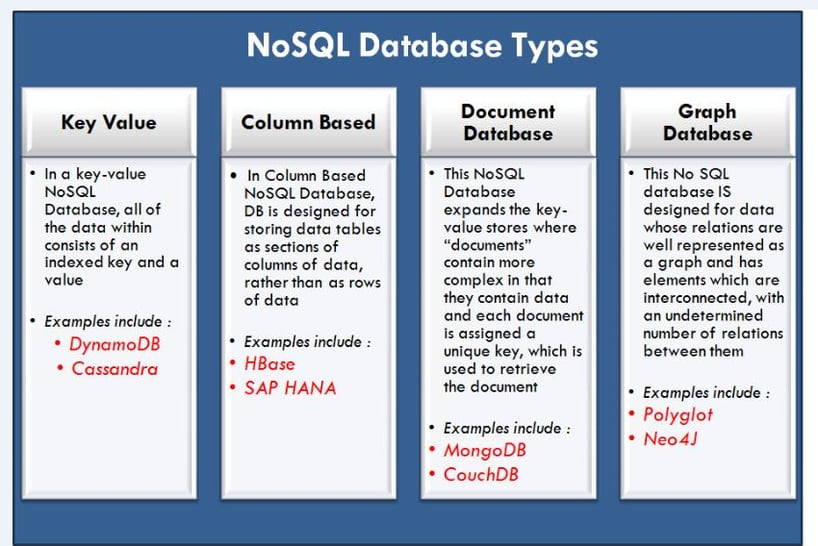Research says, 2.7 Zetabytes of data exists in the digital universe today.
A mind-boggling statistic, isn’t it?
Now, imagine the rate at which social networking applications like Twitter and Facebook generate unstructured data that is accessed constantly. Every day, every hour the data generated is unique, stored and served back.
Have you ever wondered what happens to the data?
This is where NoSQL comes into the picture - NoSQL - Stands for Not Only SQL
A NoSQL database enables storage and retrieval of data which is displayed in any format other than the tabular storage as used in traditional databases. It has no or lesser dependency on external table to fetch or store data.
NoSQL is especially useful in business environments as it handles requirements like:
- Huge and ever-growing data
- Agility in retrieving the data and serving it.
- Synthesize and analyse the data or expose the data to 3rd party tool for analysis
- Cater to a specific need of customer with high availability.
Hence when business requires a very agile way of data handling, processing and delivery system, NoSQL is a cost-effective solution.
Data flexibility, scalability and speed are synonyms to NoSQL. NoSQL database, when methodically distributed over zones, can scale, meet the demanding hits, and provide data on the fly, apart from giving the low latency required for real time interface with your customers.
Some major challenges that are addressed by NoSQL:
- Twitter app generating 7 Tbs plus of daily tweets and displaying it back.
- Property details in a Real-estate website, redundant in nature but accessed in huge numbers.
- Online Coupon sites distributing coupons to open market.
- Update of railway schedules and accessed by thousands of users at peak time.
- Real time score update of baseball / cricket match.
NoSQL is an alternative to traditional database and is a more cost-friendly approach. Here the data can easily grow by distributing itself over lots of ordinary and cheap, cloud servers.
Plus, NoSQL database is exactly the type of database that can handle the sort of unstructured, spaghetti and unpredictable data (e.g. user data/tweet) that meets business requirement.
However, the BIG question is - Where do you apply NoSQL?
The simple answer is - Apply it in applications/tools/website where a high volume of data needs to be handled with high performance and high availability. Based on your requirements, you can opt for any of the 4 basic types of NoSQL databases.
There are 4 basic types of NoSQL databases:

Another criterion to choose NoSQL is an assessment of project or volume generated:
- Their data storage needs cannot be fulfilled by one machine.
- Number of operations cannot be fulfilled by one machine.
- The availability requirements cannot be fulfilled by one machine.
- The data updates are too frequent and have no latency time.
To understand this further, let’s take a hypothetical scenario of this classified website.
A typical classified website has visitors and registered user coming for separate categories. Some users might be coming to list the property and others viewing the list with random surfing. The business owner needs to cater all the requests and data that is generated by visitors and backend administrator.
The challenge for such owner will be:
- Manage availability of fresh and constantly growing website data.
- Availability of older and historical data.
- Generate website usage patterns and analysis.
- Keep the website performance up to mark to keep the competition at bay.
- Handle and analyse structure date e.g. – listing & unstructured data e.g. web page visit pattern.
- Possibility to add and reduce category, geographic division and new sub domain.
The above scenario is an ideal scenario for using NoSQL for every growing data with agility to serve back the data with speed.
Apart from this, NoSQL can easily be deployed in various domains such as -
- Detecting Fraud in ecommerce - algorithm rules, client information / location, transaction information, last device usage etc.
- Digital data, Mobile data and Communication
- Analyses of huge unstructured data for social tracking and trends.
- Internet of Things. (IOT)
- Ecommerce, hotels, travel - Catalogue availability
- Real-Time Big Data Accessibility and management. - NoSQL can be deployed at Frontend that can store and serve operational data from multi source.
- NoSQL can also be deployed at the Backend to aggregate, store and create analysis and results.
NoSQL databases were developed in response to the sheer & random volume of data being generated each day by modern users and their applications. NoSQL enables applications to quickly process this data.
Do you need assistance with managing your data? Drop us a two-liner about your concerns and one of our representatives will surely get in touch.



